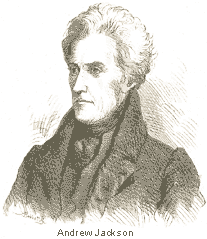The Election of 1828 was a transforming event from several perspectives. Andrew Jackson's victory broke the line of presidents from Virginia and Massachusetts, and to many citizens represented the triumph of the common man. He hoped to increase economic opportunities for ordinary citizens, even if it meant destroying the lives and property of Native Americans.
 The new era was marked by a distrust of the nation’s wealthy elite and their presumed tool, the Bank of the United States. Also in 1828, increased democracy was evident in the fact that 22 of the 24 states utilized popular elections to select their presidential electors; the other two continued to rely upon the state legislatures to do so. Also in this election, a new two-party system emerged.
Jackson’s first administration (1829-33) was notable for his actions regarding the “Spoils System”, a Deteriorating Relationship with Vice President Calhoun, and the fight over the (Second) Bank of the United States (the Bank War).
During his second administration (1833-37), Jackson dealt with a Nullification Crisis, the money question, Native American relations and the joint issue of Texas and Slavery.
The new era was marked by a distrust of the nation’s wealthy elite and their presumed tool, the Bank of the United States. Also in 1828, increased democracy was evident in the fact that 22 of the 24 states utilized popular elections to select their presidential electors; the other two continued to rely upon the state legislatures to do so. Also in this election, a new two-party system emerged.
Jackson’s first administration (1829-33) was notable for his actions regarding the “Spoils System”, a Deteriorating Relationship with Vice President Calhoun, and the fight over the (Second) Bank of the United States (the Bank War).
During his second administration (1833-37), Jackson dealt with a Nullification Crisis, the money question, Native American relations and the joint issue of Texas and Slavery.